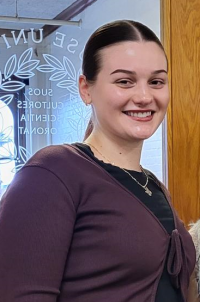A School of Education graduate student who led diversity, equity, inclusion, and accessibility (DEIA) awareness initiatives at her undergraduate alma mater is now helping to advance Syracuse University’s DEIA objectives through her role in the Office of Diversity and Inclusion (ODI).
 Carlee Kerr, who is in her first year in the Higher Education master’s degree program, serves as a graduate assistant in ODI. She helps with strategy, program planning, event logistics, and other hands-on activities that increase awareness and promote DEIA objectives among students, faculty, and staff. Those initiatives are a critical component of the University’s new academic strategic plan, “Leading With Distinction.”
Carlee Kerr, who is in her first year in the Higher Education master’s degree program, serves as a graduate assistant in ODI. She helps with strategy, program planning, event logistics, and other hands-on activities that increase awareness and promote DEIA objectives among students, faculty, and staff. Those initiatives are a critical component of the University’s new academic strategic plan, “Leading With Distinction.”
Before coming to Syracuse, Kerr earned undergraduate degrees in History and Gender and Women’s Studies at the University of Rhode Island, where she was one of the co-creators of Diversity Dialogues, a student-led initiative offering dialogue-based workshops on DEIA and social justice. For her work on the initiative, Kerr earned a schoolwide student leadership award. The Graduate School spoke with Kerr about her undergraduate diversity activism, her current role, and her future career interests.
What does your current work in ODI entail?
My projects include the staff mentoring program, developing a workshop on microaggressions, coordinating staff and faculty affinity groups, helping coordinate activities for Posse Scholars, and assisting in the execution of the recent DEIA Symposium. Working with Armando Martinez, Director of Inclusion and Belonging, I also am assigned various logistical tasks.
Tell us about your DEIA work as an undergraduate student.
With Diversity Dialogues, I facilitated workshops designed to improve the campus climate and educate more people about topics and experiences they may not have had, discussed, or thought about. It created a safe space for students to have those conversations and learn from fellow students what to say and do and what not to say and do. We reached about 1,500 students over two years. It was definitely difficult; people don’t always respond well when you’re challenging preconceived notions. Regardless of that, our assessments showed that it was really important work.
What attracted you to Syracuse University?
I was fortunate to work with Vice President for Diversity and Inclusion Mary Grace Almandrez at the University of Rhode Island’s Office of Community, Equity, and Diversity, where I was an undergraduate scholar-of-residence. Her work ethic and passion are so inspiring! After she came to Syracuse, she suggested that I consider the academic programs here. As I began to look into the School of Education’s Higher Education and Cultural Foundations of Education graduate programs, I found there was a strong sense of diversity, equity, inclusion, and accessibility embedded into the curricula. I knew I wanted to continue to do DEIA work, and I found Syracuse had many opportunities that would allow me to do so.
After learning more about the Higher Education program from Professor David Pérez II, I quickly felt welcomed and had a strong feeling that this was a program in which I wanted to enroll. And I knew [the position with ODI was a great opportunity to develop academically, socially, and professionally.
“As I began to look into the School of Education’s Higher Education and Cultural Foundations of Education graduate programs, I found there was a strong sense of diversity, equity, inclusion, and accessibility embedded into the curricula.”
How does your work with ODI align with your life goals?
I have always advocated for others when I knew something wasn’t right or something needed to be changed to support everyone. The passion of everyone in ODI is very affirming. It’s not just that people come to work and do their jobs; they embody DEIA values and foundations in every aspect of their lives. In the future, I hope to become involved in educational policy and political work. Through my work here, pushing toward equitable access and advocacy, I know I will learn so much that I can take with me in future endeavors.
Why is it important for ODI to involve students like you?
I believe my perspective is very valuable to help meet the University’s goal to support and uplift students. Oftentimes, I feel like there is a gap between the administration and students when it comes to the work the University is doing, particularly surrounding DEIA initiatives. I encourage students to ask questions and find ways to get involved in DEIA efforts because our voices matter, especially in times of political change and scrutiny surrounding DEIA. Learn more about the School of Education’s master’s degree program in Higher Education or contact Professor Cathy Engstrom
Learn more about the School of Education’s master’s degree program in Higher Education or contact Professor Cathy Engstrom.
